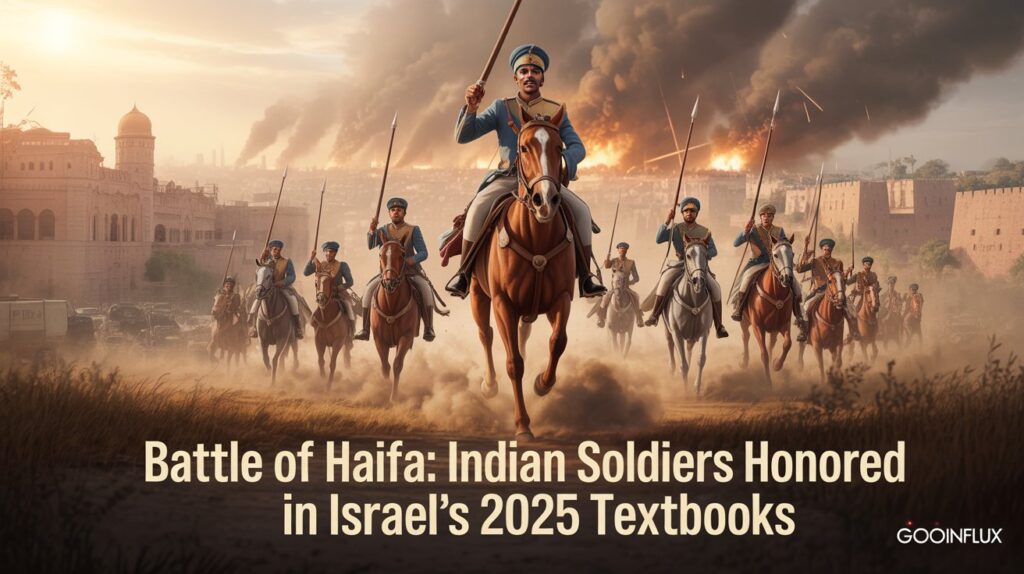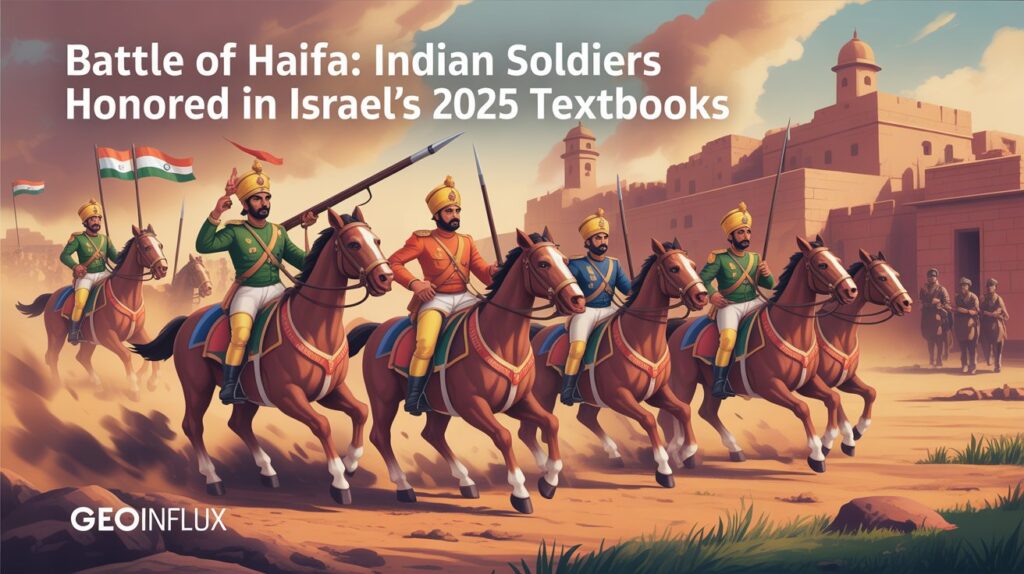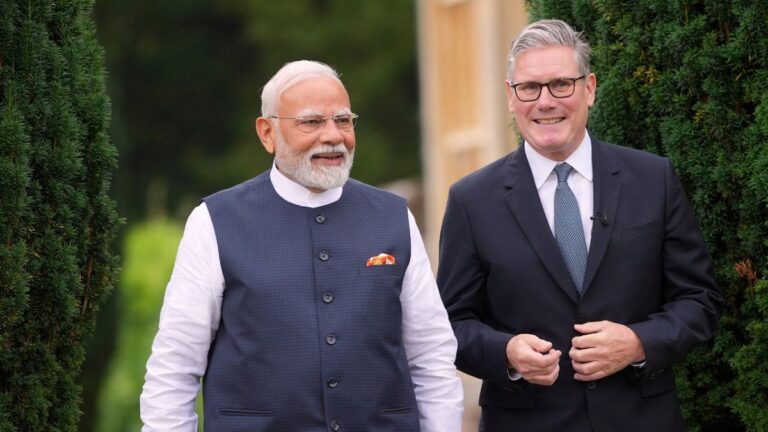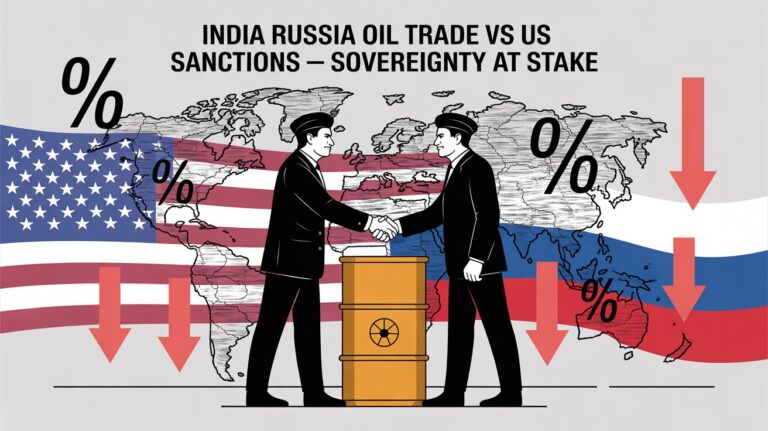Israel has updated its history books to credit Indian soldiers for the 1918 Battle of Haifa, reshaping Haifa Day, Teen Murti Memorial, and India-Israel ties.
The Untold Story of Indian Soldiers in the 1918 Battle of Haifa
Why has Israel suddenly changed its textbooks to highlight Indian soldiers in the 1918 Battle of Haifa? The answer lies in a mix of historical correction, cultural diplomacy, and evolving India-Israel ties.

This article explores how the revision reshapes Haifa Day in India, the role of Teen Murti Haifa Chowk, and why the Battle of Haifa is remembered as the last great cavalry charge in world history.
For readers interested in broader diplomatic developments between India and the Middle East, check out our India-Middle East Diplomacy coverage for related analyses and strategic insights.
Why is Israel changing its history books now?
For decades, the Battle of Haifa was taught in Israel with a strong emphasis on British-led campaigns, with Indian soldiers mentioned only in passing.
However, growing research and archival discoveries revealed the decisive role of the Jodhpur and Mysore Lancers in liberating Haifa from Ottoman forces in September 1918.
The decision to update Israel’s history books reflects a recognition of historical accuracy, but it also has political undertones.
By acknowledging Indian soldiers, Israel strengthens ties with a key partner in Asia.
The move also aligns with the municipality of Haifa, which has long recognized Indian contributions with annual ceremonies.
Beyond accuracy, this change is a form of “safe history.” It avoids controversial episodes like 1948 and instead highlights shared victories from World War I.
By reframing history in this way, Israel creates a narrative that appeals to both local pride and diplomatic sensitivity.
What role did Indian soldiers play in the 1918 Battle of Haifa?
On September 23, 1918, Indian cavalry regiments, especially the Jodhpur and Mysore Lancers, carried out a daring charge against Ottoman and German defenses in Haifa.
Despite facing machine gun fire and fortified positions, they broke through, capturing the city with minimal casualties.
This liberation was one of the most remarkable feats of the First World War.
The Indian soldiers’ bravery was recognized in military reports of the time, but colonial narratives often downplayed their contribution.
Today, Israel’s decision to revise its history books corrects that oversight, giving Indian regiments the credit they deserve.
The victory also had long-term significance: it freed Haifa from Ottoman control, shaping the city’s modern identity.
For India, it was a proud moment in military history, now increasingly remembered on Haifa Day.
Why is the Battle of Haifa called the ‘last great cavalry charge’?
The Battle of Haifa is remembered as the “last great cavalry charge” because it was among the final large-scale battles in which mounted soldiers defeated entrenched, modern defenses.
By the late stages of World War I, mechanized warfare , tanks, trucks, and machine guns had largely replaced horses.
Yet in Haifa, the Indian cavalry not only succeeded but also turned the tide of battle. Israeli historians now emphasize this fact in revised history books, noting its symbolic place in both Indian and global military traditions.
This title also enhances the legacy of Indian soldiers, making the Battle of Haifa part of a global military narrative rather than just a regional footnote.
For India and Israel, it stands as a unique reminder of shared history.
How does Haifa Day connect India and Israel today?
Haifa Day is observed annually on September 23 to honor the Indian soldiers who liberated the city in 1918. In India, ceremonies are held at Teen Murti Haifa Chowk in New Delhi, while in Israel, memorials are organized in Haifa itself.
The day carries deep symbolic value. For India, it acknowledges the global sacrifices of its soldiers in World War I. For Israel, it reinforces historical bonds with a modern strategic partner.
The fact that both nations commemorate the same event underscores the cultural and diplomatic role of history in present-day relations.
With Israel’s updated history books now highlighting Indian soldiers, Haifa Day has gained even greater visibility, serving as a bridge between the two nations.
What is the significance of Teen Murti Haifa Chowk in New Delhi?
Teen Murti Haifa Chowk is the most visible monument in India dedicated to the Battle of Haifa. Originally known as Teen Murti Chowk, it was renamed in 2018 during Israeli Prime Minister Benjamin Netanyahu’s visit to India.
The memorial honors the cavalrymen who fought in Haifa and stands as a permanent reminder of India’s contributions to global history.
Every Haifa Day, Indian and Israeli officials gather here for commemorations, reinforcing the shared narrative.
By linking Teen Murti directly to Haifa, India underlined the importance of this event in its national memory, and Israel’s new history books strengthen that symbolic connection further.
How does this curriculum change impact India-Israel relations?
By crediting Indian soldiers in its history books, Israel is not only correcting past omissions but also engaging in subtle diplomacy.
The acknowledgment builds goodwill with India, a rising power in Asia and an important strategic ally in defense and technology.
For Israel, it is also a way to deepen cultural diplomacy. Recognizing Indian sacrifices offers a positive counterbalance to narratives dominated by colonial powers.
For India, the acknowledgment validates its soldiers’ contributions to global history and enhances its soft power in West Asia.
This curriculum change demonstrates how history can be used as a diplomatic tool, building bridges through shared memory.
What are the strategic insights from this history shift?
The recognition of Indian soldiers in Israel’s history books carries broader strategic implications.
- First, it signals that Israel values cultural and historical diplomacy as part of its relationship with India.
- Second, it reflects an effort to highlight “safe history” episodes that bring nations together rather than divide them.
For India, the change validates the sacrifices of its soldiers and boosts its narrative as a global power with a long-standing history of international contributions.
This shift also opens doors for joint educational programs, cultural exchanges, and future military commemorations.
Ultimately, this move demonstrates that history is not just about the past — it is a living tool of diplomacy and strategy.
Recap: Why Israel Credits Indian Soldiers for the Battle of Haifa
| Event / Factor | Date / Context | Significance |
|---|---|---|
| Battle of Haifa | 23 Sept 1918 | Indian cavalry liberated Haifa from Ottoman rule |
| Teen Murti Haifa Chowk | 2018 (renaming) | Strengthened India-Israel cultural memory |
| Israel textbook change | 2025 | Recognition of Indian soldiers in Israeli schools |
| Haifa Day (India) | Annual, Sept 23 | Celebrations at Teen Murti & Haifa memorials |
FAQs
1. Why did Israel change its history books to credit Indian soldiers for the Battle of Haifa?
Israel changed its history books to credit Indian soldiers because earlier accounts minimized their contribution. By updating textbooks, Israel acknowledges their bravery and strengthens cultural ties with India. This correction ensures that Israeli students learn how Indian cavalry regiments shaped the city’s destiny during World War I.
2. What is Haifa Day in India, and how is it celebrated?
Haifa Day in India is observed on September 23 each year. The Indian Army and officials lay wreaths at Teen Murti Haifa Chowk, while Israel holds its own ceremonies in Haifa. The day represents shared historical memory and strengthens India-Israel relations.
3. How does Haifa feature in Israel’s modern history books?
In the revised curriculum, Haifa is highlighted as an example of international solidarity in World War I. Indian soldiers are credited with playing a decisive role, and Israeli students are taught how their liberation of Haifa shaped modern history.
4. Why is the Battle of Haifa called the ‘last great cavalry charge’?
It is called the last great cavalry charge because Indian regiments achieved victory using mounted assaults against fortified defenses, a tactic that had nearly vanished in World War I. The story is now central to both Haifa Day and Israel’s history books.
5. How do Israel’s updated history books impact India-Israel relations?
The curriculum change enhances India-Israel relations by validating India’s military contributions. It serves as cultural diplomacy, helping Israel honor India’s role in shaping its history while deepening bilateral ties.
6. What is the significance of Teen Murti Haifa Chowk in India?
Teen Murti Haifa Chowk is India’s memorial to the soldiers of Haifa. Its renaming in 2018 tied Delhi’s landmark directly to the battle, strengthening symbolic links between the two countries.
7. How do Israeli schools teach the Battle of Haifa after updating their history books?
Israeli schools now teach the Battle of Haifa as a story of bravery led by Indian cavalry regiments. Teachers emphasize how these soldiers liberated the city, making the event part of Israel’s local history while connecting it to global lessons of solidarity.
Related Articles
- Why India and Israel are Strengthening Defense Ties in 2025
- How Cultural Diplomacy Shapes India’s Global Image
- The Role of Indian Soldiers in World War I: Forgotten Histories
References
- Haifa Municipality Archive
- Indian Army – Haifa Day
- The Hindu – Haifa Day Commemoration
- Times of Israel – Battle of Haifa History
- MEA – India Israel Relations
More on Geoinflux







